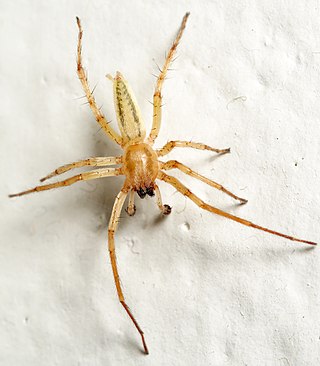
Anyphaenidae is a family of araneomorph spiders, sometimes called anyphaenid sac spiders. They are distinguished from the sac spiders of the family Clubionidae and other spiders by having the abdominal spiracle placed one third to one half of the way anterior to the spinnerets toward the epigastric furrow on the underside of the abdomen. In most spiders the spiracle is just anterior to the spinnerets.

Catasetum, abbreviated as Ctsm. in horticultural trade, is a genus of showy epiphytic Orchids, family Orchidaceae, subfamily Epidendroideae, tribe Cymbidieae, subtribe Catasetinae, with currently 200 accepted species, many of which are highly prized in horticulture.

The collared trogon is a near passerine bird in family Trogonidae, the quetzals and trogons. It is found in Mexico, throughout Central America, and in northern South America.

Corinnidae is a family of araneomorph spiders, sometimes called corinnid sac spiders. The family, like other "clubionoid" families, has a confusing taxonomic history. Once it was a part of the large catch-all taxon Clubionidae, now very much smaller. The original members of the family are apparently similar only in that they have eight eyes arranged in two rows, conical anterior spinnerets that touch and are generally wandering predators that build silken retreats, or sacs, usually on plant terminals, between leaves, under bark or under rocks.

Pera is a genus of plants in the family Peraceae native to tropical America, from southern Mexico and the West Indies south as far as Paraguay. It first described as a genus in 1784.

Theridiosomatidae, commonly known as Ray Spiders, are a family of araneomorph spiders first described by Eugène Simon in 1881. The family includes 137 species divided between 20 genera. They are most recognizable for their construction of cone-shaped webs.

Mabea is a plant genus of the family Euphorbiaceae first described in 1775. It is native to Central and South America as well as Mexico and Trinidad.
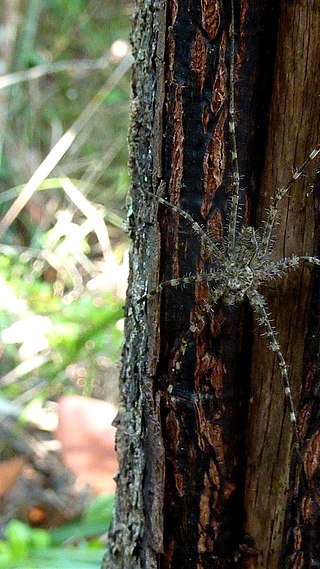
Trechaleidae (tre-kah-LEE-ih-dee) is a family of araneomorph spiders first described by Eugène Simon in 1890. It includes about 140 described species in 16 genera. They all live in Central and South America except for Shinobius orientalis, which is endemic to Japan. Other names for the family are longlegged water spiders and fishing spiders. The family Trechaleidae is closely related to Pisauridae and Lycosidae, and the three families are sometimes referred to as the lycosid group.
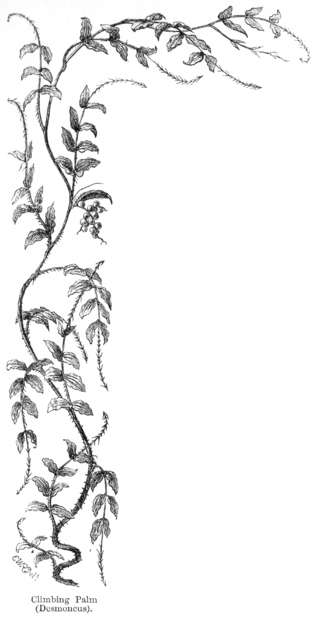
Desmoncus is a genus of mostly climbing, spiny palms native to the Neotropics. The genus extends from Mexico in the north to Brazil and Bolivia in the south, with two species present in the southeastern Caribbean.

Oenocarpus is a genus of pinnate-leaved palms (Arecaceae) native to Trinidad, southern Central and tropical South America. With nine species and one natural hybrid, the genus is distributed from Costa Rica and Trinidad in the north to Brazil and Bolivia in the south.

Prestoea is a genus of palms native to the Caribbean, Central and South America. Its range extends from Nicaragua and the Greater Antilles in the north to Brazil and Bolivia in the south.

Eschweilera is a genus of woody plants in the family Lecythidaceae first described as a genus in 1828. It is native to southern Mexico, Central America, South America, and Trinidad.
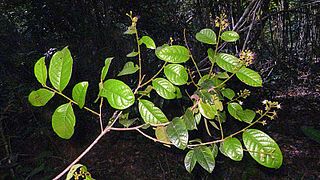
Hirtella is a genus of 110 species of woody trees in family Chrysobalanaceae. It was first described as a genus by Linnaeus in 1753. Hirtella naturally occurs in tropical forests throughout Latin America, the West Indies, southeast Africa, and Madagascar. The flowers are mainly pollinated by butterflies.
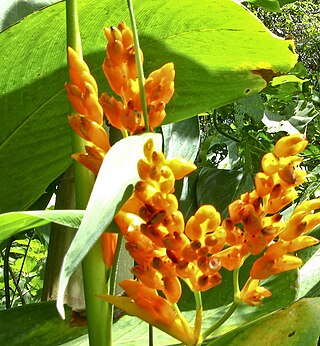
Stromanthe is a genus of flowering plants in the family Marantaceae, native to the tropical portions of the Americas from Mexico to Trinidad to northern Argentina.

The following outline is provided as an overview of and topical guide to South America.
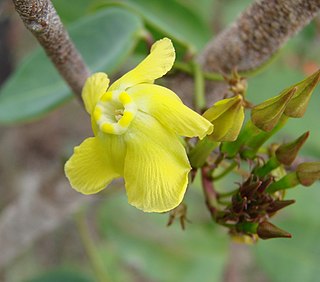
Prestonia is a genus of plants in the family Apocynaceae, first described as a genus in 1810. It is native to Mexico, Central America, South America, and the West Indies. It is closely related to Artia and Parsonsia.

Dimerandra, abbreviated Dmd. in the horticultural trade, is a genus of flowering plants from the orchid family, Orchidaceae. The group is found across tropical America: southern Mexico, Central America, the West Indies and northern South America.

Calycophyllum is a genus of flowering plants in the family Rubiaceae. It was described by Augustin Pyramus de Candolle in 1830. The genus is found from Mexico, Central America, South America and the West Indies.
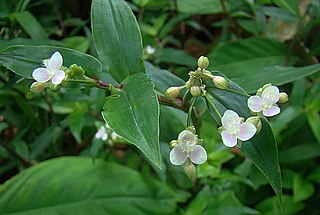
Tripogandra is a genus of flowering plants in the spiderwort family, Commelinaceae. It is native to the Western Hemisphere from central Mexico and the West Indies south to Argentina.
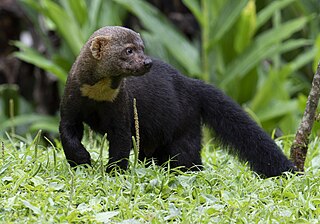
The tayra is an omnivorous animal from the weasel family, native to the Americas. It is the only species in the genus Eira.




















